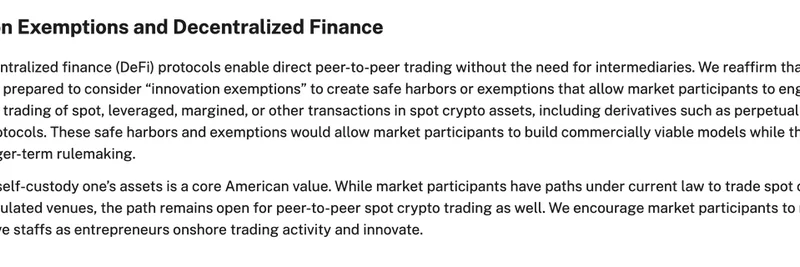Hey folks, if you're deep into the world of decentralized finance (DeFi) or just dipping your toes into meme tokens on chains like Solana, you've probably got your eyes peeled on regulatory updates. That's exactly what we're diving into today with this intriguing tweet from Solana Legend, a key voice in the Solana ecosystem and co-founder at FrictionlessVC. Posted just yesterday on September 6, 2025, the tweet highlights a fresh joint statement from the U.S. Securities and Exchange Commission (SEC) and the Commodity Futures Trading Commission (CFTC). Let's break it down in simple terms and see how it could shake things up for crypto trading, including those wild meme coin rides.
The image attached to the tweet is a screenshot of the official joint statement titled "Innovation Exemptions and Decentralized Finance." In essence, it's a reaffirmation from both agencies that they're open to considering "innovation exemptions" to foster DeFi growth. For those new to this, DeFi refers to blockchain-based financial services that run without traditional middlemen like banks—think direct peer-to-peer trading of cryptocurrencies on protocols built on networks such as Ethereum or Solana.
Key Takeaways from the Statement
The core message? Today's DeFi protocols already enable seamless peer-to-peer trading without intermediaries, and the SEC and CFTC are prepared to explore safe harbors or exemptions. These would allow market participants— that's you, traders, developers, and even meme token creators—to engage in spot trading, leveraged trades, margined positions, or even derivatives like perpetual contracts over DeFi platforms. The goal is to let innovation flourish while the agencies work on longer-term rules.
Why does this matter? Well, self-custody of assets (holding your own crypto keys without relying on a third party) is framed as a core American value here. While there are already regulated venues for trading spot crypto, the path for pure peer-to-peer (P2P) trading remains wide open. The agencies are encouraging folks to chat with their staffs to onshore trading activities and innovate safely.
Solana Legend's tweet adds a layer of foresight: "Depending on the level of decentralization and the assets being traded, it is foreseeable that L2s with a single sequencer could be treated as 'securities exchanges' under the 1934 Securities Act. The SEC has given guidance on safe harbors for truly decentralized protocols." Breaking this down—L2s are Layer 2 solutions, scalability upgrades on top of blockchains like Ethereum, often with a "sequencer" that orders transactions. If it's a single sequencer setup, it might not be decentralized enough and could fall under securities regulations, potentially classifying the whole platform as an exchange. But for truly decentralized ones? Safe harbors could apply, opening doors for compliant trading.
How This Ties into Meme Tokens and Solana
At Meme Insider, we're all about those viral, community-driven meme tokens that explode on fast chains like Solana. This regulatory nod could be a game-changer. Imagine trading meme coins via DeFi protocols without constant fear of enforcement actions. Safe harbors mean builders can create commercially viable models for spot trading or even leveraged bets on meme assets, all while staying on the right side of the law. For Solana users, this is particularly exciting since the network's speed and low fees make it a hotspot for such activity. If L2s on Solana (or similar) get the green light for decentralization, we could see more onshore innovation, reducing reliance on offshore platforms.
Of course, this isn't a free pass—participate responsibly, meet with regulators if you're building, and remember that current laws still apply for regulated venues. But it's a positive signal that the U.S. is warming up to DeFi's potential, which could boost confidence and liquidity for everything from blue-chip cryptos to the next big dog-themed meme token.
What Should Blockchain Practitioners Do Next?
If you're a developer, trader, or just a meme token holder, keep an eye on follow-up guidance from the SEC and CFTC. Engaging early—perhaps through those staff meetings mentioned—could help shape the rules. For now, this joint statement is a step toward balancing innovation with oversight, potentially making DeFi more accessible and less risky.
Stay tuned to Meme Insider for more breakdowns on how regulatory shifts impact the meme coin world and beyond. What's your take on this? Drop a comment below or hit us up on X!



